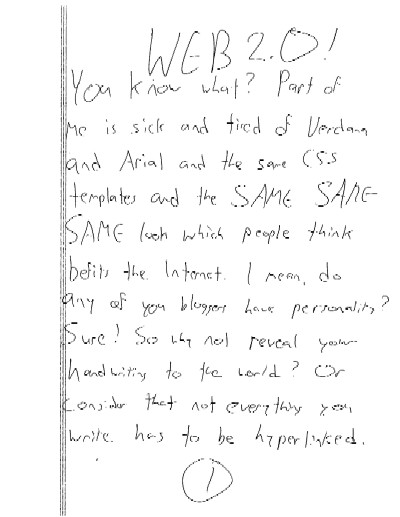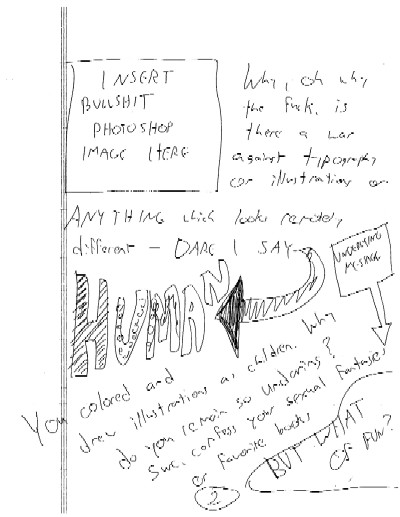I wasn’t able to make it, but thankfully Tito Perez has offered a report of last night’s Paul Auster appearance.
Category / Uncategorized
In Defense of Cultural Reference
Jessa Crispin offers yet another one of her trademark “I hate it so I’ll spew vile without supportive examples” columns for the Book Standard. Beyond the troubling hyperbole (“Those books should die”), strangely reminiscent of an infamous 1933 conflagration, there are troubling generalizations here.
For one thing, Crispin cites only one novel (Miss Misery) while declaring a rampant epidemic. She writes, “Do we need to know what beverage these characters drank before filling out their meme? Good God, no,” before declaring, “It’s making an entire generation of men’s writing look bad.”
Let us give Crispin the benefit of the doubt, assuming for a moment that this emoboy novel plague has, in fact, tarnished the edifices of every Manhattan building, that nearly every publishing executive and publicist is hot to trot for the next touchy-feely dick lit title, and that half of every novel turned out by a thirtyish male writer might be styled “emoboy.” Even if Crispin utterly loathes these books (assuming that she can identify a second one beyond the Andy Greenwald title), is not Crispin’s complaint not with the books, but with the type of man portrayed in these books? And if fiction has a duty to portray the culture around us, is it not obligated in some way to present the banal fixations or the ugliness of this so-called emoboy culture so that future generations might understand it? (I’ll get back to this rhetorical question in a trice. Bear with me.)
Why set limits on what today’s novelists write about?
Further, what exactly is wrong with reference? When someone writes that they enjoyed last night’s Arctic Monkeys show, how are they capitulating to product placement or name dropping? It is no different from having seen Hostel the other night or watched the latest episode of The Bachelor. Or, for that matter, brushing one’s teeth. Whether we like it or not, we’re living right now in a world of cultural reference. And for those who decry this or require copious amounts of Percoet to cope, I would suggest that they take up the pen themselves or they come up with an alternative for how novelists should chronicle this, rather than dimissing, without example or justification, a novelist’s initial attempts to come to terms with this sociological phenomenon.
Cultural generalizations sometimes have certain advantages. To use Crispin’s example, anyone who is even remotely a music geek or a concertgoer knows that a My Morning Jacket fan in his early thirties is going to be one of those types still struggling to justify his desire to rock out while paying a mortgage or beginning a family. (Here in San Francisco, you often see such types at Bimbo’s 365 for lo-fi bands and, in the worst cases, for utterly shallow performers like Josh Rouse.)
I think that these so-called “emoboy novelists” (which, until further examples are provided, we can confine only to Greenwald) are merely describing the world around them, not trying to show how hip they are. Granted, when pop cultural references are used exclusively as a crutch and there is nothing more than these references, I agree with Ms. Crispin that this may be a problem. Then again, who are any of us to suggest that a particular writer’s method of chronicling the world is the right one? It seems then that Crispin has adopted the reactionary (and currently favorable) tone of such traditional critics as B.R. Myers and James Wood, whereby any novel outside hard realistic fiction should be dismissed on sight.
To go back to this question of cultural references as a qualifier, I should note that one cannot imagine reading the plays of Moss Hart and George Kaufman without the cultural references. In The Man Who Came to Dinner (and this is just at the top of my head; I know this because I once acted in a community theatre production of this play and in fact begged the director to keep in the 1930s-specific cultural references, despite the fact that we all knew they’d puzzle the audience), there are references to Philo Vance, Schiaparelli, Man Ray, the Maharajah, and Louella Parsons. Most of these are uttered by the protagonist Sheridan Whiteside and are absolutely indispensable in showing the considerable class division between Whiteside’s smug yet debilitated position and the earnest small-town eccentrics who try to attend to him.
But cultural reference goes far beyond mere class division. A few years ago, on a hypercurious lark, I went to the San Francisco Main Library and began photocopying Herb Caen’s columns from the San Francisco Chronicle. I still have an extremely thick bulging folder filled with these photocopies. I started from the beginning at 1938, studying them to see what had become of the City I loved so much. I discovered such fascinating (and forgotten) cultural references as the below:
- Pins and Needles — The only Broadway hit produced by a labor union.
- The Martha Washington Candy Shop chain — Once a prominent candy chain, the See’s of its time, and fondly remembered by many for its vanilla butter cream coated with dark chocolate.
- The WPA Music Project — An opportunity for musicians to get funding during lean times. Even if the music might have been amateurish, there is still a very fascinating story of stipend cuts (with funds reallocated to interbay transport) which permitted the Oakland musicians to meet with the San Francisco musicians, and vice versa — thus giving the name an indisputably frugal association.
- Alexander’s Ragtime Band — A hugely popular movie laden with historical inaccuracies (such as telephones appearing before their time), likely joked about among film geeks during the time in much the same way that today’s film geeks joke about the watches in Spartacus or the fact that Krakatoa is actually west of Java.
- The Yosemite — the last ferry to transport cars across the Bay as the Golden Gate Bridge opened.
I should point out that many of these references simply involved the names alone and I had to find the context on my own. But doing the detective work proved invaluable for understanding some of the references I found repeated throughout Caen’s columns and within other literature that I had read from the same time period. More importantly, it gave me a sense of understanding the way that people related to each other. Because for the people who lived in the 1930s, these names and places were vitally important cultural reference points in their daily lives.
It’s often difficult for any of us operating in the present to understand just how ephemeral our world is and how the memories we hold dear, whether it involves meeting the love of one’s life for the first time while listening to Ella Fitzgerald playing in a Peet’s Coffeehouse. Sometimes the ineffable nature of a fluttering heart means that a writer must resort to a certain context in order to come closer to the experience. Further, whether fiction writers realize this or not, they are to some extent chroniclers and historians. So if we declare war on cultural reference and discourage its propagation, then how will tomorrow’s scholars (or amateur photocopiers) know precisely how or in what context (even the shallow ones) that we lived?
Web 2.0
Chris Penn Found Dead
Well, this is both very unfortunate and very mysterious. I never thought Chris Penn got the credit he deserved. Personally, I’ll never forget Penn’s incredible performance in Abel Ferrara’s The Funeral.
On Tome Kvetchers
There is a peculiar type of literary snob which I’ll call the tome kvetcher: generally, a miserable individual so utterly stingy about books that they have almost completely lost the capacity to enjoy them. Despite having a case stocked with 600 unread books, the tome kvetcher will never able to “find a book to read.” And if we take this grievance at face value, it is as preposterous as suggesting that a deep sea fish will never be able to find an oxygen molecule to take in through its gills. For even if we apply Sturgeon’s law, 600 unread books turns up 60 very good titles. And this is assuming that the tome kvetcher, who has already applied standards that are probably more elitist and ridiculous than the average literary connoisseur, has obtained or purchased all of the books himself!
Bad enough that the tome kvetcher fails to live dangerously and/or actively, simply pulling a random book from the shelf and seeing if it rocks his world, but the tome kvetcher often takes out this batty neurosis on peers (strangely similar to how trust fund kids complain about how “bored” they are, despite the fact that their parents have purchased every known possession and then some for them and have spent countless dollars on psychotherapy and antidepressants and acupuncture and various editions of the Ungame) and expects them to empathize with this horrible malady. For the tome kvetcher, this apparent inability to take the plunge, something that most well-adjusted readers seem to manage on a regular basis without bitching about it, is an existence tantamount to starving in Ethiopia. One often hears a tome kvetcher moaning loudly in a bookstore, often disrupting those who are truly excited to be surrounded by so many fabulous books, and one ponders calling the men in white suits.
Maybe my own thoughts on tome kvetchers are heavily influenced by the considerable galley guilt that has kicked in and because I am touched by the fact that so many nice people send me books while also saddened that I cannot possibly read them all and that I must purge (and possibly because I was raised polite and am, in general, a veritable ball of enthusiasm), but by what right and for what purpose do these tome kvetchers exist? Do you mean to tell me that of all the great books published through the past few centuries that you cannot find even one to satisfy you or give you pleasure, wisdom or joy? Do you mean to suggest that you are wasting hours of your life shifting books around just to find one that will fit your finicky standards, which will of course change later because your tastes are about as dependable as driving a Kia cross-country?
Well, if that’s the kind of gloomy life you lead, then why the hell are you reading in the first place?

